#just absolutely incompatible with social settings
Explore tagged Tumblr posts
Text
leon doing an undercover mission where he has to pretend to be a normal fast food worker, but he starts having a breakdown. and then gets a promotion at his real job for playing his role perfectly.
#the idea of leon being completely dysfunctional in regular society#just absolutely incompatible with social settings#shitposting through the pain#leon's toughest battles -> asking someone for extra sauce#i haven't even done the interview yet and i feel myself breaking apart at a molecular level
44 notes
·
View notes
Text
Astra: Some more random syscourse ramblings to put my thoughts to paper:
In my response to anti-endos and other confused systems I often point out that tulpamancy isn't a spiritual practice but a specific type of endogenic plurality. This is actually kind of misleading, however. It's not misleading in that tulpas aren't a form of endogenic plurality. They absolutely fit by definition (although this is also a draining of nuance which deserves a post on our main blog @thecandlelightsociety ), but the majority of tulpamancers don't so easily fit by community and culture.
To put it simply, the tulpamancy community and the endogenic and plural community have very different cultures from eachother. These differences come from a few key factors that should be kept in mind.
Some of these factors are:
1. Separate community starts and development in isolation. For a long time the two communities only bumped into eachother on occasion, and at least on the tulpamancy side the plural community was seen as strange and misinformation heavy, but also seen with curiosity for what could be used to improve the practice. It wasn't until later in the community timeline that the two groups started to directly interact and mix, with mixed spaces now being much easier to find.
2. Different approaches to understanding plurality/tulpas and how that affects worldviews. Tulpamancers have a much more experimental and analytical approach to how tulpas work and develop, while the plural community often runs far more on emotion and empathy first, accepting a much wider slew of experiences without as much skepticism. Both communities have a wide range of experiences more and less believable than others, but tulpamancy culture promotes focus on what makes an experience, while plural culture will focus on assuring the validity of the experience.
3. Lack of exposure to non tulpa plurals leading to tulpa specific concepts, models, and advice being common which may be incompatible with wider plurality. Building off the first two's points, the tulpamancy community has beliefs and advice which can work well for us, but could be useless or actively negative to many plurals. Concepts like these include dissipation, host/tulpa dynamics, approaches to system health, and others. This certainly doesn't apply for everything, and we know many non tulpa systems who have benefitted from a tulpamancy switching guide, or have made tulpas for their system. There's just a certain amount of caution needed when adapting concepts from one group over to the other, especially for tulpamancy and CDD interactions.
4. Roots going back to 4Chan instead of Tumblr. This one doesn't need much elaboration. 4chan has a very different set of rules compared to tumblr, and some of those subcultural views persist despite tulpamancy mainly being a reddit and discord focused community now.
5. Different demographics leading to different things being commonly accepted or taboo socially and politically. For instance, the tulpamancy has a much larger center to right wing demographic than the plural community, even though both still have large left leaning populations. This can lead to more ideas and perspectives in the tulpamancy community which would be frowned upon in the plural community, and vice versa.
These are just some of the things to keep in mind when discussing the tulpamancy community specifically in comparison to the usual broader endogenic label and plural community. As always with this blog, please remember that this post does not contain nearly the full nuance of the situation and subculture. We are a stressed procrastinating college student who has worked on and off on this and other post drafts all year in short bursts. Some of it is definitely going to be biased and scatterbrained.
Thank you for reading, and we're always open to asks even if we're not the fastest at responding!
#syscourse#pro endo#plural#plurality#tulpamancy#tulpas#tulpa system#plural community#tulpa community#endogenic
12 notes
·
View notes
Note
What do you think modern tech will/could look like in ATLAverse? Legend of Korra had Roaring 20s tech, but I wonder if the next Avatar’s companions will have a blog or something lol
But more seriously, if weapons/warfare was so advanced, are there other aspects of tech that might be affected? Just spitballing, wanna hear your thoughts
Honestly I'm dreading the furthering march of technology in the Avatar series. It's not that I'm a huge sci fi hater, I just hate the way its executed 90% of the time.
I didn't like how tlok incorporated technology into its world with Technology Revolution style tech. I wasn't opposed to the Avatar world growing with technological advancements. However, the usage of heavy references to the industrial revolution that kickstarted a fresh new wave of colonialism and imperialism feels like a misstep.

The East Asian side of the roaring 20s had a striking aesthetic and was certainly a fascinating time and place. But a lot of it was born of western meddling, of "civilising efforts", if you will.

It's also just incompatible with Avatar's world, since its history was very different from our own. No western meddling, no ww1, etc...
I'm not saying that the world of Avatar wouldn't have technology on par with our own, however, I think it would look different (and not just 'chinese reskin' style different) and would probably pop up in different ways than in our own.

Like, irl telegraphs have been adapted to languages and alphabets other than english. But would one created from scratch by non english speaking people really work the same as the ones from our world?
To answer your question, I can absolutely see the future Avatar having more robust technology. Those leaks everyone was freaking out about mentioned a hoverboard which does not spark joy. As well as the leaked designs giving massive voltron vibes. A lot of shows for younger people are trying with varying degrees of success to incorporate social media. So it wouldn't be out of the question for there to be some type of social media style thing in the new show. Though the apparent post apocalyptic setting the leaks spoke of may place a damper on that.
I can see the future of avatar technology verring towards spirit energy, which we see pioneered in B4.

Varrick described it as a potential source of clean energy, and it's already shown to be a powerful energy source and weapon, drawing clear parallels to nuclear energy. I can totally see spirit energy being the future of technology in the Avatar verse.
It would probably replace electricity and maybe even fossil fuels, giving the future tlok technology more compact and futuristic designs. yay 😒
#avatar#new avatar#legend of korra#tlok#the legend of korra#avatar the legend of korra#atlok#lok#atla#avatar: the last airbender
14 notes
·
View notes
Note
do you not view capitalism as a system whose driving force is the accumulation of profit or something? because if you do, it becomes pretty hard to square with your statements about 'market anarchism' or 'social democracy.' nobody's saying capitalism is incompatible with social welfare in an absolute sense, but it is clearly incapable of being a system that prioritizes social welfare over profit in the long term, even if under limited circumstances it might make concessions to it
lots of liberals see capitalism this way, and many of them specifically support it *because* it's profit-driven, which means that market forces around shifts in demand and competitive downward pressures on prices actually become a mechanism for delivering on social welfare. there's nothing meaningfully communist about this position and stacking communism on top doesn't actually connect the two together, it just has a different set of unjustified normative commitments tangled up in it.
5 notes
·
View notes
Text
“family” as a lot of people conxeptualize it — a place of particular love, care, closeness and security — is incompatible with family as a mode of social organization and hierarchy. i’m not feeling particularly well so i’m not sure i’m articulating this great but like, what i’m trying to say is that the traditional family is authoritarian by nature, and to achieve what most people think of with the word “family,” as in a place of constructive, loving, safe relationships, it must necessarily not resemble the nuclear family — in particular meaning that the family cannot be isolated, cannot inherently supersede other relationships, and cannot be driven by authority or exist as a hierarchy. the concept of “family” as a set of positive and nurturing relationships is fundamentally incompatible with shit like discipline.
i think a lot of people think like, “the problem is we should try to get parents to be nicer to kids,” but really the problem is that parents have absolute power over kids, and often fathers have absolute power over the household. it’s an authoritarian system. the problem isn’t that we have to replace mean despots with nice ones, it’s that these hierarchies exist at all. there’s nothing wrong with loving your relatives or parents or whatever but The Family as a system of power and as a little island you’re trapped in and receive all your care from is fucked.
honestly i wish there were separate words for these two conceptions of family. i think the idea of a particular set of people with whom you feel safest and most supported is great, and that doesn’t necessarily need to coincide with who you’re biologically related to. and it’s obviously useful to have a word for people you are related to and raised with. but i think lumping all these things under “family” when family is also a system of harm can make it difficult to criticize that system without sounding like you have a problem with like, support networks. sometimes it’s difficult for me to disentangle those ingrained associations, and i feel pretty critical of family as a victim of familial abuse.
i guess im not sure where i’m going with this post beyond that i generally agree with what i know about family abolition and also that i still feel really mad that people who don’t understand these things about family will try to talk about family in a like, transgressive anti-patriarchal way, and then just end up reinforcing this stuff
3 notes
·
View notes
Text
Umireread - Turn of the Golden Witch: Chapter 7: 'Furniture' and 'People'
Sat, Oct 4 1986 - 6:00PM
The following contains spoilers for the entirety of Umineko. Please do not read if you are yet to finish it.

Is the sky worsening? Or is the mood? With the talk of blue and grey skies, could the typhoon not just be a plot device to facilitate the classic setting of a murder mystery, but relevant to the deeper commentary of perception as a whole?
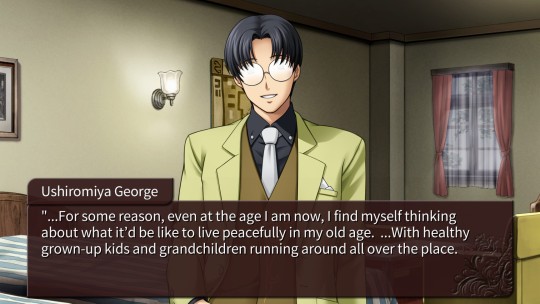
Poor Yasu. It must hurt a lot whenever she hears about George’s eventual dreams and desires and how they’re incompatible with her. The reality of the situation setting in, I suppose.

We’ve talked about finding joy in the mundane, and I do find myself wondering about the silly details of reality that don’t get addressed here. Who’s eating all the extra meals that get made? I presume whoever takes Kinzo’s meal to the study gets his, Yasu probably has to eat for both Kanon and Shannon whenever Gohda is cooking for everyone (since they can just cook a single meal and pretend both Kanon and Shannon has eaten when they do it themselves), but how are they handling Beatrice’s meal? Is Yasu eating all three? Are they throwing the food somewhere and hoping no-one finds it? This is one of those things that really doesn’t matter, but is fun to think about.
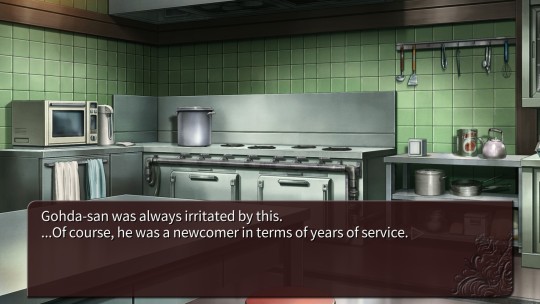
I do really love Gohda as an outsider to the servants - he adds a nice dynamic by not having everyone in the staff automatically being together on team Yasu. Thinking about it, I kind of wish we had more of a dynamic between Battler and Gohda, given they’re both “outsiders” to the family. I could see a natural bond happening there - and while the Ushiromiya tend to be naturally prideful and look down on the servants, we’ve already had scenes with George and Shannon falling for them, so there’s a precedent there for the new generation to look at them as humans rather than furniture.

And Kumasawa’s at it again. Still not quite sure what to make of this.

So this scene is interesting by itself - but it’s also another reflection on the absolute meaninglessness of tradition and seniority (even if it’s being done through Gohda’s tinted lens of desire). Is there something to be said about the western fascination detailed through the Ushiromiya being tied to a criticism of Japanese society unconditionally demanding respect for elders? This would be a pretty hot take for a fairly fundamental part of society, but I don’t think it’s inconceivable - we’ve already seen how Krauss, as the eldest, is easily the most incompetent of Kinzo’s children; and a good portion of the tale dwells in Kinzo’s sins as well. Perhaps, once again, Ryukishi’s past as a social worker has made him reconsider this axiom of society, given the amount of terrible elders he’s no doubt had the misfortune of encountering?
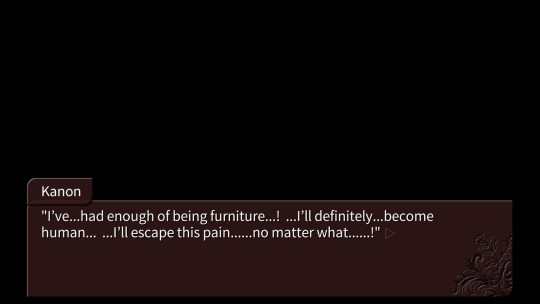
Another pretty heavy scene of Yasu questioning herself regarding the upcoming events of the night - although the phrasing of this “discreetly” taking place in the corner of the kitchen is rather amusing given how emotional Kanon is getting. Of course, if this was all taking place as an internal dialogue…

Yasu literally caught daydreaming, ha.

Can’t wait for the Nanjo black magic arc. I wonder if the book he picked up is one of the ones in a foreign language that he can’t read? Wouldn’t put it past him, if he’s sufficiently bored.
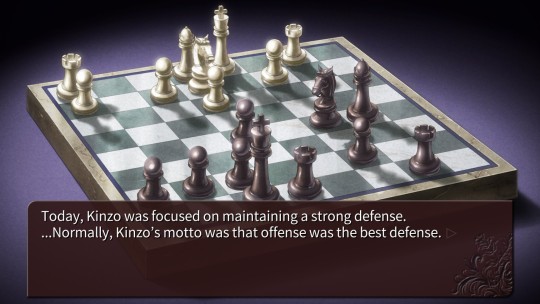
Interesting comment - is this reflective of Battler for this game?
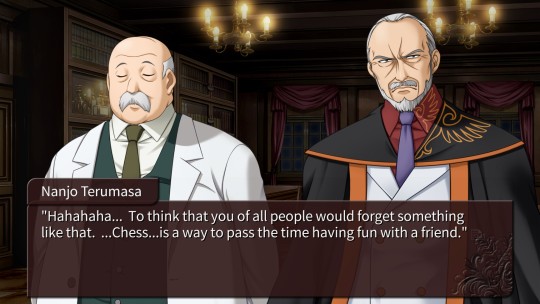
I think there’s something to be said about all the times that Umineko is stating the central message in the early episodes, but you’re not going to pick up on it while your brain is focused on solving the mystery. Kinzo talking about how chess is about having fun isn’t going to tell you who the culprit is, why the murders are happening, or reveal any new information - but that’s exactly what’s happening on the meta level, isn’t it?

And we’re even literally talking about it going on in purgatory. It’s incredible how on the nose we can get at times.
It feels odd to ignore the Shannon-Beatrice scene here, but I’m withholding my thoughts on that. The inner monologue is inherently intensely complex, so it’ll be better suited to the Wake than a liveblog.
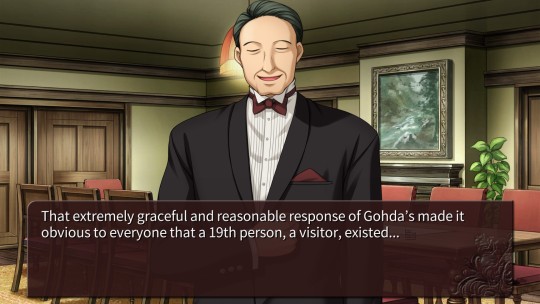
Another classic “Obvious” from Umineko.

Gee, Rosa is saying this like she’s under gunpoint. I wonder if she’s been coerced into something.
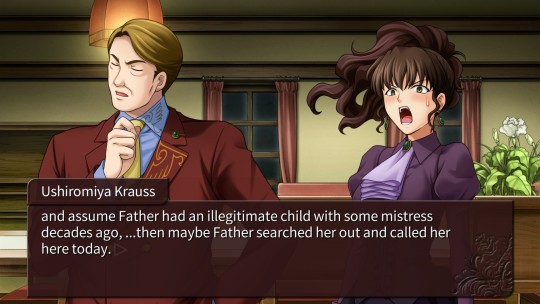
Well yeah, we have an entire Epitaph designed for that exact purpose.

There’s certainly something to be said about how the clock sound is the same one used for the guns being cocked. Quite a loaded concept, eh?
2 notes
·
View notes
Text
Blog 2: That '70s Show (1998-2006)
Hi everyone! I have returned
While on the subject of 1970s culture following my previous post, I thought that I would talk about That '70s Show. I watched it a lot in high school and I've decided to rewatch the series for the millionth time. Now that I got the first few episodes down, let's get into it.
That '70s Show follows a group of six friends who navigate their teenage and adult years in 1970s Point Place, Wisconsin: Eric, Donna, (Steven) Hyde, (Michael) Kelso, Fez and Jackie. The group normally hangs out in Eric's basement, where the majority of the show takes place as well as the hub, which is a restaurant that is considered to be one of their hangout spots. Fez is short for foreign exchange student because they could never find out his actual name or where he is from. Also, I could never understand the machoness of guys preferring to be called by their surname.
I think out of the bunch, my favorite characters would have to be Eric and Donna. Eric is a smart, respectable goody two shoes who wants to stay out of trouble and tends to be socially awkward. I could easily relate to him without the socially awkward part because I was a goody two shoes myself in school and struggled to stand up for myself, so I hated feeling confined to that particular image. I also love his smart aleck personality because I tend to be the same way. Donna is tomboyish with a feminist outlook who isn’t afraid to speak her mind and believes that women are more capable than being housewives or stay at home moms, which is the reason she is one of my favorite characters. For a fictional character in the 1970s, I have mad respect for her.
I love Donna and Eric's relationship, but the girl best friend/girl next door is an absolute cliché. I also feel like that it is very overrated, but thinking about it, it is set in a time period where cell phones were unheard of and apps like Tinder didn't even exist. They have so much chemistry especially at the very start of the show and it becomes obvious that they have feelings for one another before they become official. Today it's amazing to see how the girl best friend or girl next door storyline can be found through fanfiction or other parts of pop culture media. But then, dating your best friend or someone you have known all of your life creates a positive outlook because they would already know you and your personality. At least they didn’t bring in the “meeting through mutual friends” storyline since they’re already part of the same friend group.
While on the subject of couples, I'm not a big fan of the Kelso and Jackie storyline. They are constantly off and on that they're gonna break up one minute and stay together the next. Not to mention that it's very high school, while they're in high school ironically. I'm not saying that they're incompatible, but it's clear that commitment strains their relationship. Kelso is the dumb pretty boy while Jackie is bossy and high maintenance, so their personalities make them an odd pairing. I find it kind of ironic that they got married in real life, so it is definitely a small world after all.
The show follows various mainstreams of 1970s culture mostly through fashion, music, furniture and psychedelia as they are the components that make the show more realistic and culturally accurate. The phone on the kitchen wall and psychedelic features are dead giveaways to the show's description. Just by observing the fashion in the first few episodes, the colors are loud and a lot of the design patterns are very unappealing. This would be the kind of fashion where you have to wear something like polka dots in order to fit in. It is safe to say that 1970s fashion trends are questionable and out of date in some ways. The prop that is considered a staple is the Vista Cruiser, which is the kind of car that Eric drives throughout the show.
Not to mention that the show is historically inaccurate, but if it fell under a nonfiction-like genre, then that would give the show a dull storyline as if it is based on a true story. Documenting every minute of a random Saturday in the mid 1970s would be a waste of time and the show would lose its purpose of entertainment and possibly audience engagement. Not to mention that airing the pilot and bringing this friend group together one by one would also lack interest. There are gender roles set in the show to make the setting accurate and traditional, but it also sends an empowering message that women can do both: work and provide for the family. I can understand how producers believe in using fashion or furniture trends to make the show look more appealing and realistic. This would not be the kind of show to learn about 1970s culture as it can carry an inaccurate representation of an era that a lot of us have never physically experienced. I would solely recommend this show for good laughs.
That '70s Show is an excellent comedy. It is the kind of comedy where it is so stupid it's funny, but it's stupid in a good way and also a classic. I love the tight-knit friendship bonds between them and how the show teaches that no matter how we screw up, we’re still friends at the end of the day. I have seen it more times than I can count and it's still as funny as the first time I watched it. If you're interested in watching the show, it is streaming on Peacock. I guarantee that you will laugh.
There is also a sequel called That '90s Show on Netflix if you're interested in that as well. I have yet to see it, but I heard mixed reviews about it
Thanks for reading! See you next time

Top: Jackie
Middle: Hyde (left), Fez (right)
Bottom: Kelso (left), Eric (middle), Donna (right)
0 notes
Text
Noirvember: Strange Impersonation (Anthony Mann, 1946)

WARNING: This entire write-up is pretty much about the ending and how it seriously hurts an otherwise really good exploration of identity. So if you haven't seen it and you don't want to be spoiled, you've been warned.
I would have given this four stars were it not for the 'it was all a dream' ending.
Expanding on this thought from a day or two ago... I think there are a lot of problems with this ending that really do hurt an otherwise very, very good movie. I think one of the biggest ones is that it does, at least in a way, feel kind of tacked on so as to give the movie a happy ending rather than a bleak one. Which just seems unnecessary. There are a lot of films of this type that absolutely do have incredibly bleak endings, and the way this would have ended without the 'it was all a dream' ending would have been bleak, but in a way that I think would have been cohesive with the story. So much of this movie is about identity, with the main character trying to reconcile the things she wants, all of which are deeply tied to he she is, with each other and trying to figure out if she can have all of those things or if they're in direct conflict with each other. There are also aspect of her trying to reconcile the core of who she is and what she values as a scientist with the expectations the other people in her life, and society as a whole, have for her. Without the tacked on ending, Strange Impersonation is a really effective exploration of what it can do to a person when the things they want are treated by people and society as being incompatible, what the things are that actually make up our identity, and what other people see as making up our identity. And the bleak ending really fits with that because it explicitly shows how much removing key aspects of a person's identity can break their psyche.
But with the "it was all a dream" ending, especially with exactly what they did with that ending, all of that pretty much goes out of the window. Instead, it becomes about how it was wanting things outside of those accepted social norms of what her identity, as a woman, should be that led to such an identity crisis, and that she learned from her dream that she should just marry the guy because she's luck he wants her.
I think that's enough to deem the ending a failure, but that's not the only problem with the ending. I don't think the people making this movie really considered what the whole thing being a dream would really say about the character. With it all being a dream, that means the way the characters are framed in the story from the point where the dream starts is all coming from her. It's what she thinks of those people. And the way her minds frames her lab assistant and the woman she accidentally hit with her car are pretty damn nasty. The lab assistant is a scheming monster who intentionally botched the experiment and set up an explosion to possibly kill her, and at the very least seriously kill her, all because she wanted to still her boss's man. And the woman she hit with her car is a terrible, lying drunk who has no problem with holding a woman at gunpoint and robbing her. All without really any reason to think these things. Looking back at the movie at everything that happened before the point where the dream starts, there is nothing that happens that would suggest these women are these monsters she's imagined in her dream. There's a point where her assistant talks about how if she had a man like our main character's fiancée, she wouldn't put off the wedding, but that's really it. There really isn't anything that she does that would suggest she'd scheme and maim in order to get that guy.
When it comes to the woman she accidentally hits with her car, I think it's even more egregious because she knows nothing about this woman beyond the fact that she was drinking the night that it happened and that she was clearly struggling both emotionally and financially. That's it. But in her dream she imagined the most horrible version of her based on that.
So really, the (probably) unintended consequence of this 'it was all a dream' ending is that it ends up making our main character, who we're supposed to be sympathizing with, look like an insecure, jealous, suspicious, judgmental, and with a heaping dose of bias against the socially marginalized.
Twist endings can work well when they're done with very thought out and specific intention. This is a really good example of how bad a twist can be when it's clearly not well thought out and considered. Honestly, the ending is so bad that I'm tempted to give it an even lower rating, but everything that came before the ending worked so well and fit together really nicely. So I just can't bring myself to give it anything lower than a 3.5. Just know that yes, the ending is handled really badly.
1 note
·
View note
Text
"What is gender artifactualism?" par Julia Serano
Why is this term needed?
I created the term to make a distinction between the idea that gender is “socially constructed” versus the idea that gender is “just a construct”—both of which are common refrains within the aforementioned academic and activist settings, but which imply very different things. As I put it in Excluded:
To have a social constructionist view of gender (by most standard definitions) simply means that one believes that gender does not arise in a direct and unadulterated manner from biology, but rather is shaped to some extent by culture—e.g., by socialization, gender norms, and the gender-related ideology, language and labels that constrain and influence our understanding of the matter. By this definition, I am most certainly a social constructionist. Gender artifactualists, on the other hand, are typically not content to merely discuss the ways in which gender may be socially constructed, but rather they discount or purposefully ignore the possibility that biology and biological variation also play a role in constraining and shaping our genders. Sometimes, even the most nuanced and carefully qualified suggestions that biology may have some influence on gendered behaviors or desires will garner accusations of “essentialism” in gender artifactualist circles... [p.117-8]
Is gender artifactualism correct as a theory?
Absolutely not. In Chapter 13, “Homogenizing Versus Holistic Views of Gender and Sexuality,” I thoroughly detail why gender artifactualism (along with its sparring partner in the nature-versus-nurture debate, gender determinism, which presumes that gender-related behaviors arise solely via biology) is flat-out incorrect as a theory to explain why gender differences exist. Instead, I forward a holistic perspective that acknowledges that shared biology, biological variation, shared culture, and individual experience all come together in an unfathomably complex manner to create both the trends as well as the diversity in gender and sexuality that we see all around us. This holistic perspective is completely compatible with the idea that gender is socially constructed (i.e., shaped by socialization and culture), but incompatible with the idea that gender is merely a social artifact (or in activist parlance, “just a construct”).
Why bother debunking gender artifactualism?
The prevalence of gender artifactualist thinking within feminism and queer activism has led to two major fallacies that have undermined these movements. The first is the idea that gender artifactualist positions are inherently liberating, progressive, and anti-sexist in contrast to gender determinism (which is why artifactualist views are so often touted in these settings). However, as I point out in Excluded:
The truth of the matter is that gender artifactualism can be used to promote sexist beliefs just as readily as gender determinism can. For much of the twentieth century, Sigmund Freud’s hardline gender artifactualist theories were used to pathologize queer people and to portray girls and women as inferior to their male counterparts. Similarly, contemporary feminists and queer activists are outraged by stories of intersex children being subjected to nonconsensual genital surgeries, or gender-non-conforming children being subjected to rigid behavior modification regimes, yet the justification for these procedures is founded in the gender artifactualist theories of psychologists like John Money and Kenneth Zucker, respectively. [p.145-146]
Indeed, I go on to make the case that both gender artifactualism and determinism have an “exception problem,” in that they focus on explaining typical genders and sexualities (e.g., the preponderance of heterosexual, gender-conforming people), yet “...fail to provide a reasonable explanation for why so many of us gravitate toward various sorts of exceptional genders and sexualities.”[p.147] As a result, both approaches can provide a rationale for pathologizing gender and sexual minorities on the basis that we represent “mistakes” or “developmental errors” of some kind.
The second fallacy of gender artifactualist thinking goes something like this: If our gender and sexual identities and behaviors arise solely as a result of culture, and given that our culture is hierarchical and sexist, then we (feminists, queer activists, people more generally) must simply unlearn these oppressive ways of being that we were indoctrinated into, and instead “do” or “perform” our genders in more liberating, subversive, and righteous ways. While this line of reasoning might sound promising on the surface, in reality, it is often used to condemn and police other people’s genders and sexualities:
After all, if gender and sexuality are entirely social artifacts, and we have no intrinsic desires or individual differences, this implies that every person can (and should) change their gender and sexual behaviors at the drop of a hat in order to accommodate their own (or perhaps other people’s) politics. This assumption denies human diversity and, as I have shown, often leads to the further marginalization of minority and marked groups. [p.134]
Granted, not all gender artifactualists buy into this idea that we can readily change our genders and sexualities in order to better conform to some political view or another. But those who do will typically cite gender artifactualist mantras (e.g., “all gender is performance,” “gender is just a construct”) in order to make their case. In Excluded, I borrow Anne Koedt’s phrase ‘perversion of “the personal is the political” argument’ to discuss how this premise has been used repeatedly to police gender and sexual expression within various strands of feminism over the years. In contrast, the holistic approach that I forward accommodates gender and sexual diversity both within our movements, as well as in the world more generally.
0 notes
Photo

(Original post from my Patreon)
Hiya Everyone!
Some might have followed all the cool things that I've been slowly but carefully been working on :) I figured I've worked on plenty of things to make it worth another post!
I don't have much to offer regarding individual interests yet, since I've been mainly focused on the basics of 'leveling' up the interests passionate score at the beginning of participating in an hobby/interest.
1. Visually seeing a sim's interests score
I wish I could've added this to the relationship panel, but that would mean this mod would become a core mod just for this UI piece :p So I decided the best approach would be to click on any sim and showing which interest your sim has OR showing what interests your sim has discovered. It's a bit easier to find out than the trait 'discovery' of another sim :)

To do:
Adding actual score numbers OR percentages into passionate/dislike
Adding a button that shows the hobbies linked and how far your sim is into that hobby (Novice, Intermediate, Master)
Clean up the UI a little (Top space needs to be way less, text is not 100% centered.) Maybe adding icons for each Interest? And adding the name of the sim whose interests you're currently checking out.
2. Debate About...
A social Interaction! If your sim loves the interest AND has finished the Research (which means your sim has now 11 points into said interest), then your sim can debate the interest with others!
It pretty much works the same as discovering a trait of a different sim; through this, they can find out if that sim HATES or LOVES that interest. And shows the animation accordingly to that. They'll also leave a notification. Another cool thing is, if you find any sims that are compatible with the interest AND your own sim has a passionate score of under 13 (20 is still the max), they can get skill points to higher their passionate score!
If a sim does know that another sim loves said interest, they'll just be talking and nothing interest will happen.
There is however a 25% chance (which can be tuned) That they can convince a sim to at least try the interest and you'll be giving the other sim a passionate point into that interest. This will only work if the sim you're talking to is between 10 and 13 points.
Two Compatible Interest sims:

Two Incompatible Interest sims:
(Which is Ironically Gunther and Cornelia :p I actually ported their pre-set interests from TS2, so they have a lot of conflicting interests... So that's on EA lol)

When Successfully convincing a sim to try an Interest....

Pie menu:
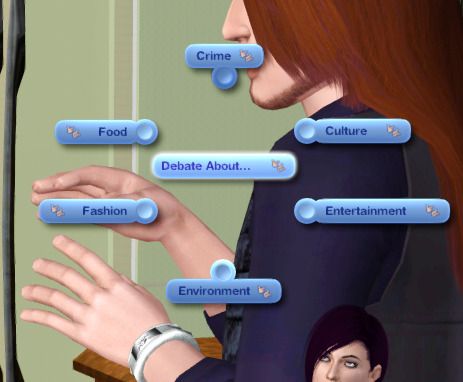
3. Rant About...
While Talking and debating about an interest your sim is passionate about is cool and all, sometimes a sim just needs to rant about that ONE Interest they absolutely hate (and maybe the entire town is into!)
(Fun fact: most of Sunset valley's sims are super into the Environment because of their traits or TS2 interests > TS3, except for Agnes Crumplebottom... I guess she was destined to also grump about people's interests rather than just love...)
Rant about's animations are pretty much just the 'complain about' animations. However, as you might have guessed, if 2 sims hate that interest, they'll show you and express the happiness of finding another sim who hates it. If its a sim that loves it, they'll let you know they don't appreciate the rant...
Here are Bella and Mortimer loving their little rant about Sports:


4. Convince To Pursue...
If that 25% success rate is not working on a sim you absolutely want to go into that interest, Or because they simply just happen to be exceeding over that 9 (or lower) or 13 (or higher) score, then this is a great workaround!
If your sim is a master in at least one hobby and are 100% passionate about that interest, then they might have a chance on getting that sim actually interested into trying. Of course, this comes with a 'success' score which is depending on the following stats:
Compatible traits with the interest (if incompatible, then that will subtract points from the final score too!)
Their relationship score
Any skills they've been up to that might fit with the Interest type?
No worries about the chances though and having to calculate all this yourself on a spreadsheet, the interaction will exactly show how much chance your sim has on convincing said sim!

5. Books!
Part of researching an Interest is reading! Unfortunately, I'm still looking into a way to get them to work properly in the bookstore, but for now, your sim can look for them in the Library :)


(I might have had too much fun with the titles :p)
The very first time your sim finishes it, they'll be getting an interest point. After that, it's 0.10 per reading (Also tunable). So it's possible to use it as a 'skill book' basically, just not the main element of participating in an interest.
Each interest-only has 1 book.
6. Magazines
You might remember from TS2 that each hobby has a magazine you can get. However, that can only be purchased in a magazine rack or being phoned up for a subscription.
However, I felt it was more suitable for it being a phone interaction or through a computer. Plus, it's just more or less a "nowadays" thing.
I was thinking of also making the magazines you get per week accessible to read on your computer/phone, but that yet has to be implemented.
About the magazines:
Each interest has a magazine that you can subscribe to. That magazine will be getting a randomly generated title. Now it may happen that "issue number 44" has the same title as "Issue number 3" because of that. But then, if you've ever had a magazine subscription, you might have noticed that magazine companies have a tendency to also re-use or recycle already written articles/sections in newer magazines whenever they seem fit.


Of course, you can only purchase any magazine interests you've actively been researching ;)

And after that, the computer will let you know all the details!


(I still need to fix that weird cancel button thingy :p)

And in case you're scared that you're not sure which magazines you have a subscription with and what's a new interest you can get it for...

The interaction will be greyed out ;)
And then just wait till Tuesdays to find your magazines!

I'm still working on a new cover for each different interest type magazine. Otherwise, I might just use TS2's :) But currently, they just got the comic covers!
---------------
And that's about it! A lot of the things changed are very 'behind the scenes', like rewriting the instantiation of interests and fixing bugs and glitches while I was playtesting it :)
#wip#hobbiesandinterests#interestshobbiesprogresslog#Work In Progress#the sims 3#ts3#sims3#Long post warning
158 notes
·
View notes
Note
INFJ. Processing past Fe failures. Want to get better at socializing / having deeper relationships/friendships. Muddling through Ti development - desiring to get better at self-awareness + communication. A lot in my brain and it'd be a lot to share the entirety of recent exchanges that have ended up in failed relationships, so I'll try asking this and hope it's enough to get critical thinking help from you, thank you much in advance. (1/2)
[con't: I notice a pattern of me trying to communicate and express myself to be understand by, or be emotionally met by Fi users, and them responding by saying things like "I don't know what you want from me", "I don't know how to help you," "I'm sorry you feel that way" or them even saying variations of "Maybe you're not used to my communication style" (ENTJ) if I express that I feel dismissed, uncomfortable, or disrespected.
This isn't ALL Fi users thank God & I'm in therapy now to address my downplaying of my emotional needs, being willing to work through anything even though the romantic relationships I'm attracting are woefully incompatible or unhealthy. But I want to get better at doing my part to increase the chance of relationships building. What am I doing/expecting/judging in my communication with Fi users so they respond that way or has me feeling being unseen/misunderstood? Is it the basic INFJ recs?]
You point to Fi specifically. Fi doesn't require outside validation, so perhaps what you're encountering is their lack of concept of outside validation, in the manner that you're seeking it with Fe.
All of those example statements sound like they could be taken sincerely. "I don't know what you want from me" could be an opportunity for you to better explain what you need/want. "I don't know how to help you" could be an opportunity for you to provide better instructions. "I'm sorry you feel that way" could be a helpless admission that the two of you don't see things the same way. "Maybe you're not used to my communication style" could be an indication that there is a need to investigate the big gap between what was perceived and what was actually intended.
Not everyone is going to see eye-to-eye with you, not everyone is going to agree with your version of events, not everyone is going to care about your needs and feelings enough to address them kindly and patiently. This should all be okay with you unless you were walking around expecting everyone out there to have the capacity to meet you emotionally or validate your emotions (unhealthy Fe)? That's simply not gonna happen, so it's an unreasonable expectation. That's why it's so important that YOU be the first to take care of yourself and own your emotions, set proper personal boundaries, and navigate interpersonal boundaries more gracefully.
If you feel someone has violated your boundary (i.e. you feel hurt by them), the answer isn't to violate theirs in return. You're trying to fix a problem in the relationship, so further damaging the relationship isn't going to help. Whether you are right to feel hurt is not the main issue. Feelings themselves are always true and tell you something true about you. However, what you DO about the feelings isn't always right. There are two main ways people deal with negative feelings: 1) bottle them up, which amounts to self-harm, or 2) express them, which opens up the possibility of doing harm to others, if they don't have the means to process your feelings. Neither way is ideal.
If your main approach is to expect people to change (when they can't or don't want to), expect them to give you more than they are capable of giving (due to not having the means or resources), expect them to understand something that they are not really capable of understanding (when they just don't think in the same way as you), etc, your expectations are easily perceived as "demands". You're essentially pressuring people to be what you want them to be, which amounts to dishonoring them and violating their boundary. This approach is usually met with submission or resistance. If they submit to you (because they care for you), they will be unhappy for having allowed you to violate their boundary, and the problem will recur because it was only swept under the rug. If they resist you, conflict ensues, and the relationship bond will be tested and possibly threatened, especially if the conflict recurs without resolution.
There is a way to honor your feelings while also honoring others' feelings. It requires you to have good emotional intelligence and be a good communicator. Good emotional intelligence means respecting your feelings and taking full responsibility for them. Instead of seeing yourself as the victim (i.e. "you made me feel this way"), you see yourself as an agent with the power to decide what is best (i.e. "I feel this way and this is what I should do about it"). Positioning yourself as a passive or helpless victim means that you cast blame and eventually demand reparations. Positioning yourself as an active and influential agent means that you survey the situation objectively and then try to act in the best interests of everyone involved. This is what healthy and confident Fe should look like.
For example, when you feel dismissed, maybe you bottle it up for awhile, until you can't take it anymore (because the problem remains unaddressed). Then you confront people and say, "I feel dismissed". This implies that the other person has done something bad to you. You are the victim, which puts them on the spot, feeling like the bad guy, and then they can't hear you, due to becoming too preoccupied with not wanting to be the bad guy. Communication is likely to stall there, unless they have the wherewithal (emotional intelligence) to keep their focus on you and your concerns.
Instead, you could say to yourself, "I feel dismissed". You take full responsibility for your feelings and validate them for yourself. When you are good at validating your own feelings and emotions (something you admit you really struggle with), you'll eventually find that you won't need to rely on others to do it for you.
What does it mean to feel dismissed? It means that you believe you're not being taken seriously, or something to that effect. Not very difficult to understand. What to do about it? The feeling of disharmony is a message to you that you have to do more to advocate for yourself and make space for yourself within the relationship/group (it is good Fe advice). There are many ways to advocate for yourself without stepping on others. If you choose the right way, in terms of honoring everyone involved, the feeling of being dismissed will dissipate naturally. If you choose the wrong way, in terms of honoring yourself but dishonoring others, you'll encounter the problem again, because you haven't addressed the underlying problem of you positioning yourself as the victim in every relationship conflict. Chronic victim mentality is often an indication that you depend too much on outside validation of your self-worth.
Unless you are stuck in a very toxic social environment, the majority of people are not malicious for no reason. Before accusing or blaming, are you absolutely certain that they INTENDED to dismiss you? If not, wouldn't it be wise to gather more info? For instance, you could ask something like, "Have you had the time to give my idea serious consideration?" No blaming, no battling, no victim-victimizer dynamic. Do you understand how communicating without blame, through genuine inquiry, avoids trapping the both of you in a vicious cycle of seeking emotional reparations? You give people the benefit of the doubt. You give people the chance to clarify or explain. You give yourself the chance to grasp the FULL picture so that you can make a more informed decision about what to do (based on their response to your question). But this presence of mind isn't possible when you can't accept your feelings/emotions and they run wild as a result.
One common misapplication of Ti is the tendency to jump to illogical conclusions or make up illogical stories about what is motivating people's negative behavior, all the while believing that you're being completely logical. It's a destructive way to deal with negative or disharmonious feelings. Once the false narrative infects your mind, you can't help but perceive the person as attacking you, even when they're not. This misuse of Ti is a major impediment to relationship building.
The problem with victim mentality is that you are hyperfocused on your perspective only, so you only have half the picture, which means making ill-informed decisions. If you are prone to Ti loop, you need to get to the bottom of why you're so quick to position yourself in the passive position of victim. A healthy relationship should be an equal partnership based on trust, which means that you should always try to 1) give people the benefit of the doubt, and 2) gather the facts of the situation before drawing a conclusion about what they intended or what kind of character they are.
If the fact of the matter is that the person really doesn't care about your feelings, then you know not to seek validation from them, and perhaps distance from them for your own good. Don't play around in toxic or abusive relationships. If the fact of the matter is that your perception of the situation doesn't match up with what they intended to say/do, then it's up to you to straighten out the situation in your mind before proceeding.
Trust your feelings, validate your feelings, but don't act blindly on them (i.e. without fully grasping what's happening with the other person). Figure out why exactly you're feeling what you're feeling, then take it up with the person in a way that addresses the root of the problem and in a way that doesn't immediately put them on the defensive. Conflict is sometimes unavoidable, but being more skilled at communicating your concerns will certainly reduce the amount of pain required to reach a resolution.
#infj#infj relationships#emotional intelligence#auxiliary fe#ti loop#communication#self worth#victim mentality#boundaries#relationships#conflict#ask
205 notes
·
View notes
Text
"Oh. The absolute beginning, then."
He took a deep breath and let it out slowly before speaking. "Before I go into this, let me tell you that I have never, ever regretting a moment of being your father. You bear no blame in any of this. You have never been a burden, you are my darling daughter and always have been. In fact, I have probably protected you too much to prevent myself burdening you with my own emotions and troubles."
His hands entwined themselves around each other, thumbs lightly twirling around each other. "To put it simply, your mother and I were forced to get married. The patriarchs of our families decided as children that we would wed as soon as we came of age and have one child. Regardless of how we felt about it, or each other. And I'm sure you can guess how much your mother likes being told what to do. And I never blamed her for hating her situation, I wasn't too pleased either to have such an important sets of decisions taken from me, but I tried to make her happy. Via, truly I tried to make a family, or at least be friends. Comfortable together."
His fingers flexed a bit. "And then you hatched and I felt my spirit soar the first time I held you. And I hoped that perhaps your mother and I could bond as coparents, but she remained aloof. Divorce crossed my mind at the time since we had fulfilled our obligation to marry and produce a legitimate heir, but I could never bring myself to do it to her. She would have become a social outcast, and society was her life. And your life would have been so much harder. Many goetian families would shun you, the child of a failed pairing. And with my work being at all hours I would hardly ever get to see you.”
He took a breath and looked intently into her eyes. “Octavia, it isn’t just that Stella and my personalities are incompatible. I am…..” He struggled for a moment. Octavia deserved the truth from his own beak. “I am homosexual. I… realize you have probably guessed. You’re a very smart person. But this is the first time I’ve said it aloud. Ever.”
Octavia fell silent as he spoke, now loaded with more questions as she saw him swiftly catch the bottle aimed at him. She had seen bits and pieces of the trial, and while her mother and uncle explained it in detail, she didn't trust their version of events. What she saw was her father leaving their home to come to the imp's aid, confessing to everything while her uncle wore a smirk that sent shivers down her spine. Hearing that he had made something up to spare the imp from execution already proved that her mother and uncle weren't being entirely truthful, and she hoped to hear more of the truth.
As Stolas led them into the building and up the stairs into the apartment, Octavia couldn't help but wince. It was a far cry from what she was used to, and the thought of her father living in these conditions left her feeling uneasy. Then again, he did choose this and did have a roof over his head; it was better than sleeping on the streets like she saw some humans do in L.A.
Once settled on the sofa, Octavia turned her full attention to him. "Starting from the beginning would help, namely how you and mother ended up married in the first place. Did you two...always hate each other? If you did, why did you have to marry, and why did you stay together? Was it because I was an obligation you had to fulfill?" She had to stop herself there or else she would continue asking questions for hours.
14 notes
·
View notes
Note
Hellooo amazing person~♡ Could I request how the brother/or just lucifer would react to MC proposing to them first?
hiii!! thank you for sending in a request, i'm so in love with this idea bestie you have no clue 💕
Proposing to your om! bf first!
who would yall propose to, come tell me, don't be shy <3
oh also; all of these scenarios assume you and him have talked about it at least once but didn't agree on exact dates or anything; so it is still a surprise but it isn't out of the blue!
Lucifer:
Your plan must be kept as top secret for him not to find out too early. One suspicious mistake and it's over.
For this reason you had to limit the relatives you involved in the planning; however, regardless of what you think of him or what your relationship is like, you must have asked Mammon for advice and suggestions (just trust him!). He knows his older brother the best, after all.
The place of your proposal had to be private but meaningful; perhaps at home after you came back from a theater date. (it is okay if his brothers are at the scene, but nobody else is allowed or it's ruined!!!)
He is highkey surprised, never would have thought you would propose first; but he finds it so bold and charming - he wouldn't reject it!
Mammon:
Honestly, when you plan your proposal you only have to worry about him being attached to you by your hip. Other than you having almost no privacy at all, your plans can easily succeed!
With him you don't really have to keep it simple, in fact, it is better if you don't!
You can plan out an entire day of activities; playing cards, going to a casino, maybe an amusement park, just make sure it's a special day, you know!
I think a good spot to propose would be the beach in the late afternoon or evening - a couple of strangers might be there but that's alright, he ain't shy!
He would be confused by you going down on one knee at first but he catches on very quick what is going on. Jokes on you MC he is also pulling out a ring as a reaction to your proposal!
Leviathan:
Definitely do it at home and keep it very private, not even his brothers are allowed to be there and see.
I think you should praise him and compliment him a little extra that day. Also consider giving a speech before it so while you talk he can gain some strength to recover.
He always wanted the wedding ending with you though so don't worry, he wouldn't reject you! Might ask for some time to think about it but in general he is very excited and turning you down is unlikely.
Clings to you so much afterwards it's very unlike him to be honest, but can you really blame him in this situation?
Finds it so hard to believe he is going to talk about it for days.
Satan:
With him you have to be sneaky if you don't want your plans to be busted; unlike Lucifer, Satan is going to pry much more. Very curious fellow!
Satan would appreciate something like proposing through a book or through a detective game with all or at least some of his brothers involved. You don't want to go all out but you don't necessary have to keep it simple either.
He is going to find himself dumbfounded when he realizes you were the mastermind behind planning it all and he noticed nothing.
He might pretend he did know where everyone was going with it but that is a white lie, don't worry about it.
Similar to Leviathan he might ask for some more time to think but he already knows he is so in love with you there is no way he could avoid marrying you.
Asmodeus:
Okay you definitely need to talk about it before you even think about proposing to him first, but if any of the brothers he is the one who is OK with proposing in public, even if the place is a bit crowded.
Though? I think he would actually likes a private proposal more. I'm just saying if you really wish to have a public one then he is your demon.
(If you want to go public you can set him up to go shopping with someone you trust and by the time they finish, have everyone he and you are close enough to (or just a flash mob?) line up outside in a maze, cheering him on, you being at the very end with your ring and a huge bouquet.)
Please have a cheesy speech about him and your love for him and about his love for you !! Appreciates it so much more than you'd think!
Also, whatever place you decide to propose at, you must have someone take pictures. Yes they are going on social media, it's ok!
Baby is going to shed tears of joy be prepared for that 🥺
Beelzebub:
I really didn't want to go the food related route here but listen there is something so romantic about it, hear me out!!
So you need to figure out what his favorite restaurant is - not going to be very easy by itself, one day he might say X but then the next it's Y.
Then you need to book a private table (absolutely do not let him pick a fast food restaurant even if he really likes them :( ) and make sure to pick an hour when it's not extremely busy. (the best would be if it's just you two but that's not easy to guarantee) and have the ring served with the food!
He is going to be surprised for sure; he never seen this item on the menu before, what is that??? oh.
Wouldn't ever reject you unless the two of you really are incompatible but by now that would've been figured out already
Belphegor:
You don't have to be super sneaky around him which is for the better because if you were, you'd need to explain yourself.
It is definitely better to have a private proposal; the only third person allowed to be there is Beel.
A calm, starry night is probably the best timing for your plan!
I don't think he is a big fan of cheesy speeches so really it's better to just keep it simple and straightforward.
Oh he might tease you into thinking he changed his mind or needs more time to think but really he is just messing with you a little
He is going to apologize, don't be too mad at him for that
#obey me#obey me swd#shall we date obey me#om! swd#omswd#obey me lucifer#obey me x gn!reader#obey me x gender neutral reader#om! levi#om! asmodeus#om! belphegor#om! mammon#om! beelzebub#om! satan#om! lucifer#obey me satan#obey me mammon#obey me asmodeus#obey me leviathan#obey me beelezebub#obey me belphegor#obey me mamon#obey me headcanons
204 notes
·
View notes
Text
Dealing with intrusive thoughts.
I will never be good or pure enough for anyone's absolute philosophy. This makes me feel bad, and like I have failed at being a good person, but the thought is a negative delusion, and does not undo the good I have done in my life previous to my failing to fit in with people who have refused to or are incapable of understanding me.
This also sets me free enough to think beyond simping for someone who simply never cared for me, or didn't care enough to make me feel like I was accepted or supported.
This sets me free enough to think about what I want to do in my life that is totally unconnected to things previous people who tried to be the leaders of my life.
I want to be open to the idea that maybe I should correct my thinking if it's bent or inappropriate or making people uncomfortable. But I have been made uncomfortable countless times, and sometimes I've been made to think that I owe the person who made me uncomfortable an apology, and that has made me even angrier. I have been apologized to before, but for other things.
My brain sticks to situations where no one has apologized to me for hurting my feelings. Some of it is me never speaking up for myself when my feelings are hurt, but I'm afraid to say it because of the inevitable shout-down of "your fee-fees don't matter, toughen up, crybaby!" Which of course just makes me cry more, and builds up my silent resentment that I hope will dissipate on its own.
But when I can't talk about my true feelings, they just stay where they are, for years. Not being able to talk to people about complex shit on equal terms makes me shut down.
I've been intimidated into and out of quite a lot of social groups, and in my desperation for community and acknowledgement, I've overextended myself.
I am healing every day I don't force myself into a situation where I feel like I've wronged someone just by standing next to them.
Learning to put myself first is scary because, as a very neurodivergent black sheep, my needs are mostly incompatible with others. I judge myself a little bit every day when I can't fit in or even silently disagree with those I care for or about, but not everyone is ever going to agree with everything someone else says.
I have attempted full agreeableness, and it has ended in misery, and resentment that is difficult to resolve. I need to fix it, but the thing I need to fix is not my incompatibility with others. The thing I need to fix is the feeling of inferiority I feel when I can't fit in.
In general, no one is telling me there's anything wrong with me but me. My notions of inferiority are echoes of past trauma, and don't apply to every situation.
I try to act with honor and respect, to bring humor and levity, and to share the works I've done with people that I hope are at least somewhat like-minded. I am not always met with the same, and it breaks my heart when I'm not.
I put so much effort into my dealings with others. It is difficult for me, with my neurodivergence, to just naturally connect. I have to work to appear human. It is work that very often goes unacknowledged, but I want to have friends and be around people so that I'm not just stuck with myself.
But when I can't really articulate that, people can't know or see what I'm doing. I need to stop sacrificing my calm to be in spaces I'm not ready to be in. And some people mislabel their spaces as safe, but I can't put my guard down until I know a space is safe for me.
When my brain is at its worst, every space seems like it is dangerous, and I feel like I cannot trust anyone, even when it's not the truth.
I'm trying to calm myself back down, and get back to a thought-space where I'm not consistently agitated. I don't want to hurt or disappoint anyone, or give an incorrect impression of myself. But I'm also in the negatives, and in the interest of keeping myself from lashing out at others, I would rather remove myself than hurt someone else. But that also hurts me, and prevents myself from getting closure, and I need to re-adjust the re-adjusted re-adjustments, which is very frustrating!
1 note
·
View note
Text
Sorting the Witches of Discworld
I don’t have a good enough handle on Agnes Nitt or Tiffany Aching enough to sort them. But here’s what I think of the first trio; Granny, Nanny, and Magrat.
Esme Weatherwax is a very blatant Bird Snake. She is ferociously, unflinchingly moral-but that doesn’t come from her gut feelings. Like Vimes, she doesn’t trust those as a source of morality. She’s made a framework of rules to follow, instead. And she is so very, very good at moving fast and finding loopholes. This is the woman who made a bunch of vampires’ attempt to turn her into her forcing them to all crave tea and biscuits! She’s always winning via trickery and improvisation.
Gytha Ogg is a Badger Snake, and one beautifully lacking any ‘red-stained ledger’ angst. Her Snake is more socially focused than Granny’s, so they both work well together and cover for each other. She models Courtier Badger secondary, and does it really well, but she’s not a Badger-she has none of their need for authenticity. She ‘tells the truth if it’s convenient’ and likes cooking if someone else is there to do the boring bits. Nanny can do the slow grind if she really must, but it is so annoying to her and most of the time she just doesn’t need to. "Witches always cheat,” she says, and that’s a point of pride to her. And she isn’t hobbled by being outside of her community. Drop her in an unfamiliar place on her own, and Nanny Ogg will still find a way to come up alright.
Granny and Nanny bond through their Secondaries by understanding each other, and bond through their Primaries by checking each other. Nanny likes people in a way Granny doesn’t, she has that innate spontaneous desire to help people because they’re people and they need it, no thinking it through required. On the other hand, because Nanny’s operating on pathos rather than logos, she’s the one who’s more likely to do the Badger dehumanisation thing-and that’s where Idealist Granny will step in to say no, even our enemies have rights, there are Rules about that.
(Also, Nanny definitely has the Badger Snake talent for helping people ‘find their chill’, and boy oh boy does Granny need that in a best friend!)
Now, Magrat Garlick is a Bird Lion. Magrat is always looking for a sense behind things, a set of rules for how to be, an order to the universe. She and Granny share a Primary...but that just leads to conflict more often than not because their Truths are so incompatible and neither is willing to abandon theirs.
Magrat’s Lion secondary is hard to see usually, because she has a strong overlay of Bird Secondary to it-she’s a research witch and a better doctor than Granny-but when she’s angry or on trouble, she sets that aside and charges. She breaks down a door to rescue Verence, she punches out Lilith’s snake women, she goes on a berserker rampage against the Queen of the Elves, she heads off at once to help Granny in Carpe Jugulum even though she has no idea what’s wrong or what she can do. In Wyrd Sisters, when she hears about how the usurper king has been slandering witches, her immediate response is “We ought to fill his bones with hot lead”. She’s also just painfully sincere, which Granny and Nanny both do not get at all-one thing that consistently enrages Magrat is when they lie, especially if one of the people deceived was her. (But they admire her charging-and Granny has absolutely factored Angry Lion Mode Magrat into her schemes. They just don’t make the link between that brilliant blazing singleminded charge and Magrat’s ‘soppy’ sincerity and openness.)
#discworld#discworld witches#granny weatherwax#nanny ogg#magrat garlick#sorting hat chats#harry potter
65 notes
·
View notes
Text
Shigaraki’s Family

Shigaraki has to date fought against villains, won, and then taken something from them in his victory. This time however he’s not up against a villain but a bad hero. The lesson Shigaraki is going to learn from Endeavor is exactly as he says: you heroes hurt your own families just to help complete strangers. Family is more important. It’s also what makes him the opposite of Endeavor, Shigaraki always chooses his found family over his own ambitions, whereas Endeavor puts his ambitions to be a hero over his family. MORE UNDER THE CUT.
1. Shigaraki and Endeavor
There is actually a lot of connecting threads between Shigaraki and Endeavor’s characters. They are both characters who are considered inferior replacements to the previous king of both the hero and villain worlds, Shigaraki is called a worthless successor again and everybody prefers All Might to Endeavor.
They are also characters who both believe they need to become stronger than anyone. Their quirks are partially incompatible with their bodies and they often hurt themselves going overboard using them and because of that they feel weak even when they are strong. Shigaraki in part - chooses to have Ujiko experiment on his body, even if it is an influenced choice. They both try to settle things with power first.
However even in that they are different: Shigaraki was raised to believe by AFO that he owed AFO, continually made to feel unworthy for everything AFO had given him and had his ambition to be king of villains thrown on his shoulders. Endeavor decided to do those things all on his own from a position of relative financial security and safety within hero society.

However, the way they treat the people closest to them is completely opposite. The League of VIllains that Shigaraki creates is again and again remarked upon as a place where people are allowed to be themselves. The league is a place of trust and acceptance. It’s remarked several times that the league genuinely trusts one another.

Consider Shigaraki’s main personality traits, anti-social, awkward, immature. He’s modeled to act like a NEET and an overgrown manchild. He easily could have made no connection at all to the League of Villains. He could have stayed the person he was at the start of the story, someone willing to kill new recruits five minutes after meeting them. He could have even run things like AFO, choosing to either turn his followers into worshippers, or act entirely from the shadows controlling them like a puppeteer.
My point being - Shigaraki is not the easiest person to get along with, or even understand, and yet he made a deliberate choice to get closer to the league. The league is this way because Shigaraki is this way. The league values people first, because Shigaraki puts people first. It’s who he is at the core of his being. Tenko played with the kids nobody else would play with, stood up to bullies, and wanted to be a hero even when his father told him no. That part of Shigaraki hasn’t changed.
It’s Shigaraki himself who creates the healthy environment of the league. Somewhere along the way, Shigaraki began to consider them a family. Even if he’s not direct in stating it, or even as outwardly friendly as Twice about it.


Shigaraki’s definition of family is made clear in his dreams and flashback. Family doesn’t reject you. Shigaraki in making the league his family sets out to do the opposite of what his father did, create a place where the people close to him are accepted for who they are and valued as individuals. They aren’t judged by their quirk, or even their contribution to the team. Giran is saved even after he stops being useful, Spinner’s quirk is so weak he can only cling to walls and yet he’s trusted as one of the top members.
The way Shigaraki treats his own family - his allies is the exact opposite of Endeavor. He doesn’t try to control who they are, he doesn’t force them, but he does lead and they choose to follow. Even members who insist again and again that they don’t care about the other members of the league, and they’re not in it to help Shigaraki like Dabi are trusted.

Compare this to Endeavor’s interactions with Hawks, someone who has been in Endeavor’s corner from the beginning and yet someone Endeavor absolutely refuses to trust or even understand a little bit. Shigaraki always gives Dabi free reign, Endeavor snaps at and threatens Hawks several times, getting angry in all of their interactions.

If the League is somewhere where you are free to choose who you are, Endeavor creates an oppressive environment. Even if he is repentant about his past actions with Shoto, he still takes every oppurtunity he possibly can to mould Shoto into who he wants him to be.

Even post redemption - Shouto has to be his heir, Shouto has to master his technique. Not only that but if Endeavor suddenly decides he wants to act more like father and son Shouto has to go along with that too. Endeavor’s view of the world is still self-centered. He’s the patriarch,he’s in a position of power, and he uses that to revolve everything around his own desires for other people.
In Shigaraki’s words, Endeavor rejects who Shoto is.
Endeavor has status, prestige, and connections in the hero world and he uses that to get what he wants: Shoto working alongside him, Shoto learning from him, Shoto allowing him to pass on his technique flash fire. When Shoto is reluctant, Endeavor will put pressure on him, send him multiple messages, contact him when he’s not wanted. When Shoto doesn’t want to play father son with Endeavor, and only wants to apprentice to him in an official capacity Endeavor acts disappointed.
Endeavor still views Shoto as the one he pours the most attention into because Shoto has the strongest quirk. Endeavor creates an oppressive environment, Shoto is not free, Shoto is not valued as an individual.
The one good thing Endeavor does is back off with Natsuo and Fuyumi, and allow them to live in a house separate from him even though he personally wants to be with the rest of his family. However, his behavior towards Shoto for the most part hasn’t changed (which is you know the foiling, Endeavor did to Shoto what AFO did to Shigaraki).
2. Family First
Endeavor’s ambitions will always be more important than his family. We see this in the choices he makes so far his arc. Let’s look at the last thing Endeavor remarked upon before the battle started.

He regrets that Toya, a child he was responsible for died under his watch. We still don’t know the exact circumstances but considering the parallel with Shigaraki it’s very possible, Endeavor’s ambitions to be a hero were what directly hurt his own son.
If Endeavor is repetant then family should come first before his ambitions correct: but here are the choices Endeavor makes this arc.

Remember Endeavor is someone who literally tried to raise a child soldier, by forcing five year old Shoto into aggressive quirk training. He of all people should be sensitive to what exactly is wrong with the Hero Commission’s plans to use children and students as a backup against villains who will be using lethal force in a war zone to try to kill them.
Not only that but he chooses this action without permission and without consent of the families of the children. Natsuo and Fuyumi have no idea what is happening to Shoto right now.

In general, the heros choose actions again and again to put the people they should be responsible for into danger. When Midnight is being overwhelmed by villains rather than telling the children she’s supposed to be protecting to retreat from the monster capable of destroying cities she asks them to do something illegal.

Whereas, the league always makes the opposite choice this arc. They choose to protect one another in the tight knit family group.

The league watches out for each other’s well being.


Shigaraki’s first order was to bring his family to him. Gigantomachia would have made it to Shigaraki’s side already, if Shigaraki didn’t value the league so much that he protected them first over himself and instructed Gigantomachia to do so as well.
The heroes right now are choosing again and again to sacrifice not only the individual, but the individuals they are personally responsible and let them go into danger for the sake of a victory.
The villains are making the opposite choice. Shigaraki is personally responsible for the found family of the league as the leader, and the league’s every choice has always been to protect each other and put the safety of their allies first rather than sacrificing them for a cause. It’s even reflected in Twice’s final choice that leds to his death. He cares more about the league to the point where he acknowledges he might be thrown out after all of this is over and still chooses to use his last act protecting them anyway.
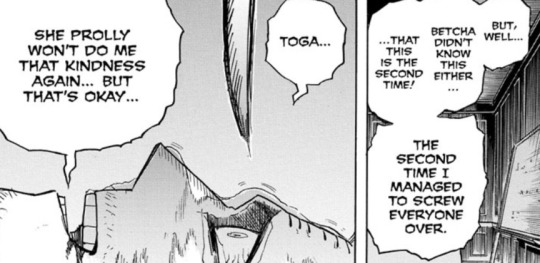

While yes, the heroes do make these sacrifices to protect innocent people. Innocent people also get hurt from these same heroes. Hawks was innocent, a disadvantaged child that the hero commission took advantage of. Shoto was innocent, but raising him up as a hero was more important than Shoto’s health and well being as a child. Heroes are supposedly making these sacrifices to protect innocents, and yet innocents still get hurt underneath the hero system that they’re giving everything to protect.
That’s why the themes of friendship and even family resonate so well with the league of villains because we’ve seen them consistently choose each other over and over again. That is likely what Shigaraki is going to awaken to at the end of his fight with Endeavor, that he’s not doing this for ambition like Endeavor, or AFO, that he really is fighting against the whole world to protect his small family.
#shigaraki tomura#league of villains#league of villains meta#shigaraki meta#my hero academia meta#mha meta#my hero academia#lov meta#shimura tenko#tomura shigaraki
445 notes
·
View notes